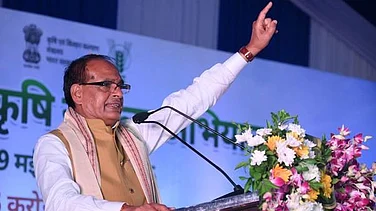Chinese electric automobile giant BYD has sought visa approvals from the ministry of home affairs for two of its executives nominated for India operations. But the clearance process is taking time and has also caused a delay in getting the director identification number (DIN) from the ministry of corporate affairs, the Economic Times reported, citing a source.
Recently, Chinese electronic appliance manufacturer Midea India “Indianised” its local unit board by hiring two Indians after it failed to get visas for its directors, who subsequently quit.
The government’s move is aligned with its cautious stance with Chinese firms given the troubled geopolitical relations between the two countries. Additionally, the central government has shown no signs of relaxing Press Note 3 of 2020, which has further complicated the business relations between the two neighbouring nations as more Chinese firms are gradually moving back to India. The 2020 note restricts investments from countries sharing a land border with India, including China.
However, recently India’s Chief Economic Advisor (CEA), V Anantha Nageswaran, emphasised greater collaboration with China to integrate it with the country’s supply chain.
“...So, one has to first resolve the question of, how do we integrate China into our supply chain, before we think about how to integrate ourselves in the global supply chain,” said Nageswaran at an ASSOCHAM event.
Speaking at an event, the chairman of the 16th finance commission of India, Arvind Panagariya, too hinted that India should open investments from China in selected sectors, several media reports reported.
China’s EV Dominance Drives Dependence
This comes at a time when numerous Indian firms are forming partnerships with Chinese giants to leverage their expertise and market dominance, particularly in the electric vehicles segment. Chinese leading EV maker BYD has surpassed billionaire Elon Musk’s Tesla as the world’s largest EV producer in 2024 by almost 150,000 vehicles. BYD manufactured 1,777,965 EVs as compared to 1,774,442 by Tesla in 2024, according to data by Statista.
According to the International Energy Agency (IEA) report, China witnessed around 80 per cent growth of EVs globally, whereas the United States witnessed just 10 per cent in 2024.
Recently, billionaire Sajjan Jindal-owned JSW Group held talks to forge partnerships with Chinese giants including BYD and Geely as the paint-to-steel conglomerate eyes to enter the electric cars and e-trucks market, ET reported. The conglomerate already has a joint venture worth $1.5 billion with China’s SAIC Motor to manufacture and sell MG EVs.
China’s dominance in the segment has made India dependent on it as the country marches forward in its EV revolution. Ola Electric’s spending share of Chinese imports as a share of total cost of material increased 37 per cent in FY24 compared to 19 per cent in FY23, according to the EV maker’s Red Herring Prospectus.
Ather Energy witnessed a similar trend; its spending share of Chinese imports as a share of total material cost went up 28 per cent in FY24 compared to 10 per cent in FY23. The figures show the dependence of Indian EV makers on China, particularly for lithium-ion cells.
But India’s reliance isn’t just on limited critical components. The Indian industries also depend on China for technicians, mainly those involved in manufacturing in the 14 strategic sectors under the production-linked incentive, including automobiles.
After the push from the Indian industry last year, the ministry of home affairs introduced new guidelines to streamline the process for granting business visas to Chinese technicians within 28 days of application.
While China’s support to India Inc. might be considered significant to boost domestic manufacturing, a report by GRTI alarms India from becoming an “EV colony” for China. GRTI’s warning comes at a time when US and European countries are closing doors for Chinese EVs with increased tariffs.
“...next few years, every third electric vehicle and many passenger and commercial vehicles on India’s roads could be those made by Chinese firms in India alone or through Joint Venture with Indian firms,” said the GRTI report.
This has posed a bigger dilemma for India Inc. as it targets to command 30 per cent of the electric vehicle market share by 2030. India Inc.’s road to meet the 2030 target is full of critical choices, including a tough balancing act between the Make in India initiative and seeking requisite support from the Chinese EV giants.
































